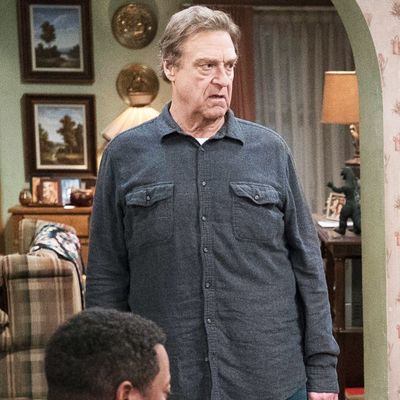
The Conners — a.k.a. the ABC Sitcom Revival Formerly Known as Roseanne — is attempting to do what very few television comedies have done before: move on without the titular star whose personality defined the show.
One could say that Two and a Half Men did something similar in the aftermath of Charlie Sheen’s #Winning phase, but in that case, Ashton Kutcher was recruited to fill the hole left by Sheen. Also, Two and a Half Men was not built around Sheen in the same way that Roseanne was branded, both in its original form and in last year’s revival, by Roseanne Barr. To reconfigure the series without her is the equivalent of airing Everybody Loves Somebody Other Than Raymond, or making Seinfeld without Seinfeld. With no Jerry, the latter’s title would literally be a blank space: Now that’s a show about nothing!
I note all of this to convey the magnitude of the challenge that faces The Conners as it aims to capitalize on the success of last year’s reboot despite the fact that Barr was fired because of a racist tweet and is no longer involved in the series. And I note it because The Conners rises admirably to that challenge, delivering kitchen-sink comedy that, at least in the initial two episodes, the first of which airs Tuesday night, is just as funny as anything in Roseanne 2.0. The Conners even feels closer in tone and intent to the original Roseanne, which is an astonishing thing to pull off with Roseanne herself no longer in the picture.
To be clear, Roseanne Conner, the character, whose twisted sense of humor and stubborn opinions formed the nucleus around which everything else on the show revolved, is missed. In the first episode, her absence is addressed quite directly, but ABC has asked critics not to delve into any of the details about that plotline, including how the show explains what happened to her. What I can say is that her presence is felt, even if she’s not physically there.
One figure whose presence is no longer felt, at least in the first two episodes, is Donald Trump. With the show’s most vocal supporter of the president now gone, the MAGA-era politics that the writers wove into the initial reboot have disappeared, too. That removes a burden that forced the new Roseanne’s characters to behave in some ways that didn’t match up with what we knew about them based on the original Roseanne. (The progressive Roseanne and, to a lesser extent, Dan, became more conservative than they were three decades ago, to an extent that felt too extreme.) That’s not to say The Conners ignores issues that fall under the political or social umbrella. The first two episodes alone deal with homosexuality — in episode two, Dan becomes a sounding board for Mark (Ames McNamara), Darlene’s gay son — teen sex, alcoholism, and drug addiction. But the source of conflicts between characters are more driven by personality than by political party.
The Conners also serves as a reminder that, while Roseanne was the show’s center, she was always surrounded by a gifted ensemble. Her departure gives the other actors, especially the women on the show, the opportunity to step up and play more crucial roles. Metcalf brings even more layers to Jackie’s scattered form of cynicism as she inserts herself further into the Conner household. Sara Gilbert, who’s always been gifted at dipping her words in sarcasm, continues to excel at making Darlene the queen of the smart-asses. But she also gets to do some genuinely moving work, too: There’s a scene between Gilbert and Metcalf in the first episode that is so genuinely heartbreaking, it actually brought tears to my eyes.
Lecy Goranson also gets more screentime as the stubborn mess that is Becky Conner, and makes her eyes twinkle in a way that suggests Becky is dancing just a few steps away from totally losing her mind. New characters are introduced, as well: There’s series regular Geena (Maya Lynne Robinson), D.J.’s no-nonsense military wife who’s back home after serving overseas; Justin Long, who will hopefully recur as a potential new love interest for Darlene; and a wonderfully dotty Juliette Lewis as Blue, the hippie girlfriend of David (Johnny Galecki) whom Darlene can barely tolerate. (Darlene’s single status takes center stage in an early episode, even though Jackie assures her, “You’re a catch. You’re an educated, diabetes-free woman in Lanford.”)
D.J. (Michael Fishman) still plays second fiddle to his sisters, a fact that’s joked about in meta-fashion in Tuesday night’s premiere, though he does get to deliver a pretty solid Mamma Mia-related joke in the second one. And of course, national treasure John Goodman and his portrayal of Dan, the patriarch with the hard shell and soft interior, is still absolutely central to the series. Goodman’s interplay with Barr, which was always one of Roseanne’s most consistent delights, is lamentably missing, but his skill with one-liners — “Seen a little too much action in ‘Nam, Joey?” he says to one of Mark’s friends after he makes a particularly bleak comment — and reliable retreats to the garage do the important work of conveying that some things in the Conners’ world will never change, no matter what.
Perhaps some viewers may feel like The Conners has lost some of the Roseanne revival’s relevance by shifting away from political talk. It’s certainly true that the route The Conners takes is a safer one. But it also confirms how funny and sturdy this family sitcom still is after all these years, even after a pivotal piece of its puzzle has been removed. The Conners, at least at this early stage, proves something that few resurrected sitcoms do: that it is possible to go home again. Even when Mom doesn’t live there anymore.


